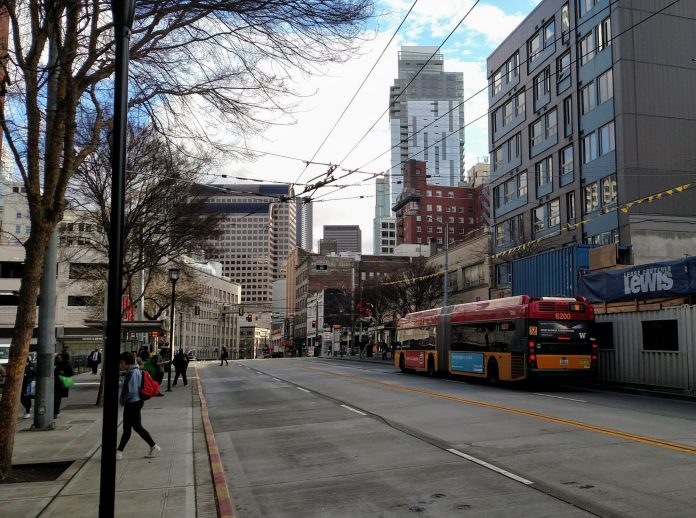King County Council Chair Claudia Balducci announced yesterday that the County would not be advancing plans to run a transit package ballot measure in August. Since the measure was to be funded by a 0.2% sales tax, there was a fear it would exacerbate economic hardship from the novel coronavirus (COVID-19) outbreak.
Leaders also worried the countywide measure wouldn’t pass. Due to the ratcheting up of social distancing measures, transit ridership was down 45% at King County Metro’s last tally, and many residents are out of work as bars, theaters, restaurants, and other businesses have closed or are operating at reduced capacity.
“Unfortunately, the extraordinary events related to the spread of COVID-19 makes a countywide August ballot measure unrealistic at this time,” Chair Balducci said in a statement. “As our community mobilizes to respond to the COVID-19 outbreak and the early signs of the economic impact of the epidemic are starting to be seen, we must shift our attention to supporting our current transit system and building momentum to re-regionalizing transit for a future ballot measure.”
That leaves the ball in Seattle’s court to run a measure in August–or in November during the General Election. Mayor Jenny Durkan had already indicated the City would move ahead and go it alone if the County didn’t get its act together and finalize legislation this week. However, the coronavirus pandemic and ensuing economic slowdown may have changed the calculus for Mayor Durkan as well.
Seattle already has a Transportation Benefit District, which expires at the end of 2020 and augments King County Metro bus service by roughly 10% and funds the free transit program for high school students at Seattle Public Schools. The loss of that additional service would be a major blow to Seattle’s transportation system–it has been credited as a key ingredient in Seattle’s national leading transit ridership growth rate over the past decade. It’s ensured 70% of Seattleites live within a 10-minute walk of frequent transit service. It’s unlikely either of those bragging points could continue without renewing funding.
Not having a countywide measure delays hopes of lowering fares for low-income riders, speeding up electrification of the bus fleet, and progressing Metro’s long-term plans for a comprehensive frequent bus network across King County, filling out the alphabet from RapidRide A to Z and perhaps beyond.
The existing Seattle Transportation Benefit District (TBD) is funded in part by $60 car tab fees and a 0.1% sale tax. Local officials seem to be shying away from car tabs as a funding source given their uncertainty following passage of Initiative 976’s $30 car tab limit and the legal challenge that followed that may or may not overturn the limit.
That leaves a sales tax hike as the likeliest funding source. A 0.2% sales tax would be felt as a 0.1% sales tax hike in Seattle since the TBD’s existing 0.1% sale tax expires at year’s end. The Washington State Legislature once again adjourned without providing cities new progressive revenue options, such as a capital gains tax or an income tax. We also failed to see progressive tax reform to lower the burden on working class people. Instead state legislators found time to authorize billions in highway spending.
Another remaining hope is that the federal government or state government would bail out struggling transit agencies to maintain service levels, if not augment them.
“We will begin to discuss how to build new funding tools at the state level to expand progressive funding sources,” Chair Balducci said. “We will talk about federal partners about opportunities for new investments in capital projects that will expand our system’s capacity, and we will continue to engage our partners across the county to ensure the need for these critical services [and] more transit is met.”
Transportation For America has started a petition asking Congress to promptly provide emergency assistance to public transit agencies across the county. So far, though, Republican stimulus and relief plans have instead focused on corporate subsidies and tax breaks for the wealthy.
Even with the setback the delay and a possible recession has dealt to King County Metro expansion plans, leaders like County Councilmember Balducci remain optimistic.
“I’ve been impressed by the excitement from partners and cities for more transit countywide. As our region grows, more people need fast, frequent, and reliable transit” Balducci said. “We remain fully committed to build our planned bus network as envisioned in Metro Connects and expand bus service that serves as a lifeline to so many King County residents.”
Doug Trumm is publisher of The Urbanist. An Urbanist writer since 2015, he dreams of pedestrian streets, bus lanes, and a mass-timber building spree to end our housing crisis. He graduated from the Evans School of Public Policy and Governance at the University of Washington in 2019. He lives in Seattle's Fremont neighborhood and loves to explore the city by foot and by bike.


